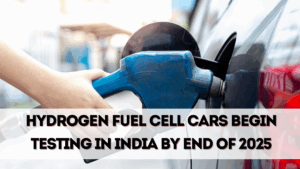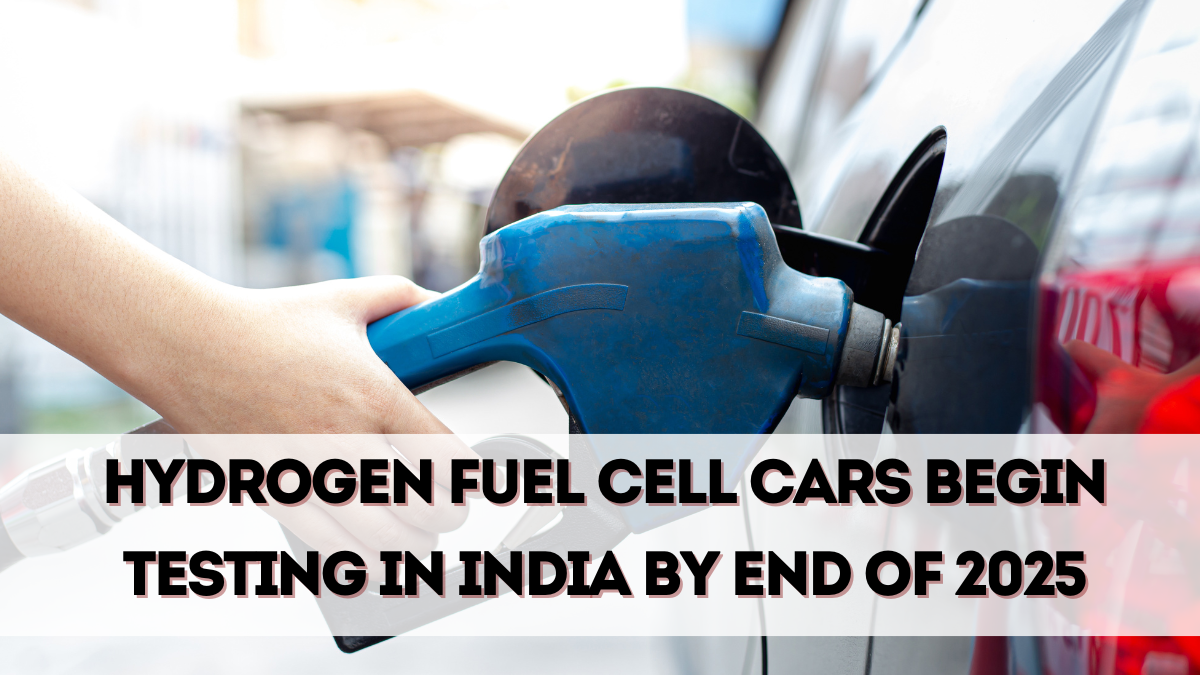India is preparing to take a major leap in green mobility with the introduction of hydrogen fuel cell cars. The government has announced that testing of the first models will begin by the end of 2025, with commercial availability expected in early 2026.
This move positions India as a serious player in the global race for alternative fuel vehicles, complementing its growing electric vehicle ecosystem.

What Are Hydrogen Fuel Cell Cars?
Hydrogen fuel cell cars run on electricity generated by a chemical reaction between hydrogen and oxygen inside a fuel cell.
Unlike traditional EVs that rely on lithium-ion batteries, fuel cell vehicles produce power on demand, emitting only water vapor as exhaust.
This makes them one of the cleanest forms of mobility available today.
Why India Is Exploring Hydrogen Cars
While EVs are growing in popularity, they face challenges such as long charging times, limited range, and dependence on imported batteries.
Hydrogen cars address these issues by:
-
Offering longer ranges of 600–700 km per refill.
-
Refueling within minutes, similar to petrol or diesel vehicles.
-
Reducing dependence on rare minerals like lithium and cobalt.
For a country like India, which needs scalable and fast solutions for clean mobility, hydrogen cars provide a strong alternative.
Government’s Hydrogen Mission
The push for hydrogen cars is part of the National Hydrogen Mission, launched in 2021.
The mission focuses on:
-
Developing hydrogen production through renewable energy.
-
Setting up refueling infrastructure across highways.
-
Supporting research and pilot projects for vehicles and fuel cells.
By late 2025, India will see pilot testing of hydrogen cars in select cities under controlled conditions.
Automakers Entering the Segment
Several automakers are preparing to bring hydrogen cars to India.
-
Toyota: Likely to lead the segment with its globally tested Mirai fuel cell sedan.
-
Hyundai: Plans to introduce the Nexo SUV, already available in international markets.
-
Tata Motors: Working on hydrogen buses and exploring passenger car prototypes.
-
Mahindra: Expected to showcase hydrogen-powered concept vehicles as part of its green mobility lineup.
These companies will play a critical role in shaping the early adoption of hydrogen technology in India.
Challenges of Hydrogen Cars in India
Despite the promise, hydrogen mobility faces major challenges.
-
Infrastructure: India currently has very few hydrogen refueling stations. Expanding this network will take time and investment.
-
High Costs: Hydrogen fuel cells are expensive to produce, making vehicles costlier than EVs.
-
Storage and Transport: Hydrogen is difficult to store safely due to its flammable nature.
-
Public Awareness: Many buyers are still unaware of how hydrogen cars work.
The government and industry must work together to address these barriers before large-scale adoption.
Environmental Benefits
Hydrogen cars offer multiple environmental advantages.
-
Zero tailpipe emissions, producing only water vapor.
-
Potential to use green hydrogen made from renewable energy, reducing fossil fuel dependence.
-
Support for India’s climate goals of reducing carbon emissions by 2070.
If implemented at scale, hydrogen vehicles could complement EVs in making India’s mobility sector truly sustainable.
Comparison with Electric Vehicles
Both EVs and hydrogen cars have roles to play.
-
EVs: Better suited for short-distance travel, city commutes, and personal use.
-
Hydrogen Cars: Ideal for long-distance travel, heavy vehicles, and areas with limited charging infrastructure.
Together, they can create a balanced clean mobility ecosystem for India.
Future Outlook
By late 2025, India will see pilot projects and testing of hydrogen cars on the road. Early adopters are expected to be government fleets, corporate buyers, and premium car owners.
Mass-market availability will depend on infrastructure expansion and cost reduction in the coming years.
If successful, hydrogen cars could emerge as a game-changer for India’s transport sector, offering an alternative to both petrol and battery-powered vehicles.
FAQs
When will hydrogen fuel cell cars start testing in India?
Testing is scheduled to begin by the end of 2025, with commercial launch in early 2026.
Which companies will introduce hydrogen cars in India?
Toyota, Hyundai, Tata Motors, and Mahindra are expected to be early players in this segment.
How are hydrogen cars different from EVs?
They generate electricity on demand using hydrogen fuel cells, offering longer ranges and faster refueling.
What are the challenges for hydrogen cars in India?
High costs, lack of refueling infrastructure, and safety in storage are key hurdles.
Will hydrogen cars replace EVs in India?
Not entirely. They will complement EVs, with EVs suited for short trips and hydrogen cars for long-distance travel.
Click here to know more.
